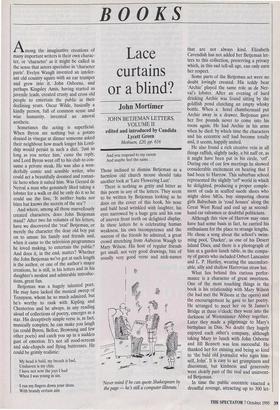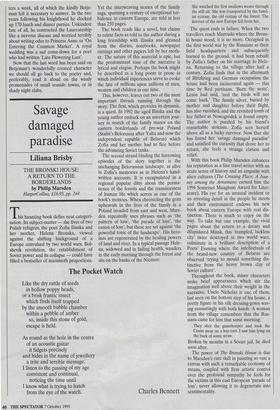BOOKS
Lace curtains or a blind?
John Mortimer
JOHN BETJEMAN LEI I ERS, VOLUME II edited and introduced by Candida Lycett Green Methuen, ,f20, pp. 616 Among the imaginative creations of many important writers is their own charac- ter, or 'character' as it might be called in the sense that actors specialise in 'character parts'. Evelyn Waugh invented an intoler- ant old country squire with an ear trumpet and grew into it. John Osborne, and perhaps Kingsley Atnis, having started as juvenile leads, created crusty and cross old people to entertain the public in their declining years. Oscar Wilde, basically a kindly person, full of common sense and wise humanity, invented an amoral aesthete.
Sometimes the acting is superficial. When Byron ate nothing but a potato doused in vinegar at dinner someone asked their neighbour how much longer his Lord- ship would persist in such a diet. 'Just as long as you notice him,' came the reply, and Lord Byron went off to his club to con- sume a private steak. He was also a won- derfully comic and sensible writer, who could act a beautifully doomed and roman- tic hero when it suited him. Was Gerard de Nerval a man who genuinely liked taking a lobster for a walk or did he only do it so he could use the line, 'It neither barks nor bites but knows the secrets of the sea'?
And where, among all these marvellously created characters, does John Betjeman stand? After two fat volumes of his letters, have we discovered the 'real' Betjeman, or merely the character the dear old boy put on to amuse his family and friends and, when it came to the television programmes he loved making, to entertain the public? And does it, in the end, matter? Whether the John Betjeman we've got at such length is the author, or one of the author's major creations, he is still, in his letters and in his daughter's modest and admirable introduc- tions, great fun. Betjeman was a hugely talented poet. He may have lacked the musical sweep of Tennyson, whom he so much admired, but he's worthy to rank with Kipling and Chesterton and he always, in any reading aloud of collections of poetry, emerges as a star. His deceptively simple verse is, in fact, musically complex; he can make you laugh (as could Byron, Belloc, Browning and few other poets) and catch you up in a sudden gust of emotion. It's not all rood-screens and side-chapels and flying buttresses. He could be grimly realistic:
My head is bald, my breath is bad, Unshaven is my chin, I have not now the joys I had When I was young in sin.
I run my fingers down your dress With brandy certain aim And you respond to my caress And maybe feel the same ...
Those inclined to dismiss Betjeman as a harmless old church mouse should take another look at 'Late Flowering Lust'.
There is nothing as gritty and bitter as this poem in any of the letters. They seem to be written by Betjeman looking as he does on the cover of this book, his nose and bald head wrinkled with laughter, his eyes narrowed by a huge grin and his row of uneven front teeth on delighted display. In these letters he is celebrating human weakness, his own incompetence and the success of the friends he admired, a great crowd stretching from Auberon Waugh to Mary Wilson. His host of regular friends get small, not very good drawings, bits of usually very good verse and nick-names 'Never mind if he can quote Shakespeare by the page — he's still a computer illiterate.' that are not always kind. Elizabeth Cavendish has not added her Betjeman let- ters to this collection, preserving a privacy which, in this sad tell-all age, can only earn her respect.
Some parts of the Betjeman act were no doubt lovingly created. His teddy bear 'Archie' played the same role as de Ner- val's lobster. After an evening of hard drinking Archie was found sitting by the goldfish pond clutching an empty whisky bottle. When a hotel chambermaid put Archie away in a drawer, Betjeman gave her five pounds never to come into his room again. He had Archie in his arms when he died: by which time the characters and his eccentric self had become totally and, it seems, happily united.
He also found a rich creative vein in all things raffish, slightly tacky, a bit naff or, as it might have been put in his circle, `orf During one of our few meetings he showed considerable excitement on hearing that I had been to Harrow. This suburban school represented the slightly 'on' world in which he delighted, producing a proper comple- ment of cads in scuffed suede shoes who might drive MGs, buy simpering chorus girls Babycham in 'road houses' along the Great West Road and end up as second- hand car salesmen or doubtful politicians.
Although this view of Harrow may once have had some basis in fact, he carried his enthusiasm for the place to strange lengths. He chose a song about the school's swim- ming pool, 'Ducker', as one of his Desert Island Discs, and there is a photograph of him at a garden lunch table, in the compa- ny of guests who included Osbert Lancaster and L. P. Hartley, wearing the uncomfort- able, silly and shallow Harrovian straw hat.
What lies behind this curious perfor- mance is a character of great sweetness. One of the most touching things in the book is his relationship with Mary Wilson (he had met the Wilsons at the opera) and the encouragement he gave to her poetry. He arranged to meet her on St James's Bridge at three o'clock; they went into the darkness of Westminster Abbey together. Later they made a pilgrimage to Mary's birthplace in Diss. No doubt they hugely enjoyed each other's company, although taking Mary to lunch with John Osborne and Jill Bennett was less successful. He thanked her for existing and being so kind to 'the bald old journalist who signs him- self, John'. It is easy to act grumpiness and discontent, but kindness and generosity were clearly part of the real and uninvent- ed Betjeman.
In time the public eccentric exacted a dreadful revenge, attracting up to 300 let- ters a week, all of which the kindly Betje- man felt it necessary to answer. In the two years following his knighthood he clocked up 170 lunch and dinner parties. Unkindest fate of all, he contracted the Laureateship like a nervous disease and worried terribly about writing odes to Princess Anne or 'On Entering the Common Market'. A royal wedding was a sad come-down for a poet who had written 'Late Flowering Lust'.
Now that the last word has been said on Betjeman's wonderfully created character we should all go back to the poetry and, preferably, read it aloud on the windy promenades of small seaside towns, or in shady night clubs.











































































 Previous page
Previous page